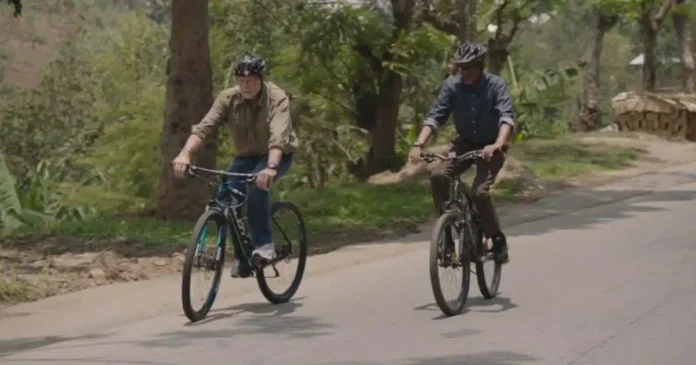The Foreign Correspondents’ Club of South Asia organized A Special Screening of the documentary RWANDA THE ROYAL TOUR with H.E. President Paul Kagame and acclaimed Director Peter Greenberg. Rwanda’s High Commissioner to India H. E. Ernest Rwamucyo introduced the film on October 15, 2019 evening at FCC Auditorium.
The programme started with S Venkat Narayan, President, FCC introducing all the guests and members followed by the speech of H.E. Ernest Rwamucyo, Rwanda’s High Commissioner to India. He unveiled this documentary of Peter S. Greenberg who is an American journalist and CBS Travel News Editor. He was Travel Editor for NBC’s Today, CNBC and MSNBC during 1995-2009. He is an Emmy award winning journalist and film producer.
He produces a television series called The Royal Tour. The series featured various heads of state giving Greenberg and viewers a personal tour of their country. It has featured a number of world leaders, including New Zealand’s Helen Clark, Israel’s Benjamin Netanyahu, Abdullah II of Jordan, and Peru’s Alejandro Toledo. Rwanda The Royal Tour stars President Paul Kagame as a wry-humored tourist guide, energetically leading the way to some of the country’s tourist attractions. The duo go gorilla tracking, canopy walking on a stomach-churning hanging bridge, jet-skiing on Lake Kivu, and cycling. Kagame also invites Greenberg to his presidential home for a round of tennis, putting up one of his royal Inyambo cattle with their majestic horns on the game.
In an interview with the president early on in the documentary, Greenberg gently raises the controversies surrounding the president as a strongman overstaying his term limits, but he’s hardly Christiane Amanpour. The often harsh treatment of Rwandan opposition politicians and exiled dissidents isn’t mentioned.
For one, government critic Diane Rwigara, who had ambitions of contesting Kagame for the presidency last year, has been in detention since September for conspiring to incite an insurrection. Rwandan intelligence agents are also accused of targeting dissidents on foreign soil, which has caused friction with countries that should be significant partners, like South Africa.
However, the glowing response to The Royal Tour reflects many Rwandans’ insatiable appetite for a positive narrative. The documentary premiered in Chicago and New York in April, with the First Children, Ange and Ivan Cyomoro, in attendance.A few days later, it was beamed on Rwandan television screens.
There was also a free public screening, courtesy of the country’s marketing agency, the Rwandan Development Board (RDB), with popcorn and cold drinks at the Kigali Cultural Village. Diplomats, officials, conference-goers (at the time the Mo Ibrahim Foundation was in town), and some of Kigali’s middle classes and elites packed out the chairs in one of the huge tents. While watching the film it felt like it wasn’t a film about a country but an advertising of Rwanda’s tourism offerings. The president can be seen projecting a sense of stability and peace and quiet. He goes around town and people are spontaneously cheering him, then it’s safe for tourists too.
Following the devastating civil war and genocide in the early 1990s, Rwanda has committed to rebuild its economy and ramp up its tourism strategies. Rwanda believes that tourism is part of the development the country that can be used to reduce its dependency on foreign aid.
Rwanda is the first the first African country to be featured in The Royal Tour series. After the screening H.E. Ernest Rwamucyo answered few questions related to Rwanda, its economy, education and business. Rwanda is looking for Foreign Direct Investments in all the sectors. When asked about education in Rwanda, H.E.E rnestRwamucyo said that Rwanda operates on a 6-3-3-4 school system, that is to say six years for primary school, three years for ordinary level (junior secondary school), three years for advanced level (senior secondary school) and four years for university bachelor’s degree.
3 official languages of instruction are used in the Rwandan education system: Kinyarwanda is used in primary school p1-p3 and English is used from p4 through university. French is taught as well but as a supplement subject in public primary and secondary schools. Each year over 44,000 students are enrolled in higher education for undergraduate, graduate, certificateand diploma programs. The University of Rwanda was recently formed as a merger of former public universities and these universities became collages of the University of Rwanda. Rwanda considers education a critical investment for the country’s future growth and development. This is evidenced by the increased share of the national budget allocated to the education sector, which is projected to increase from 17% in 2012/13 to 22% in 2017/18. In the past few years, the education system in Rwanda has gone through an impressive period of growth especially in terms of access.
Still, the country faces many challenges such as the onerous task of double-shift teaching for the primary school teachers and the language transition from French to English for grades 4 and above, which has been very difficult for teachers who do not have adequate time to improve their proficiency in English language. He also stated that teachers and professors from India are visiting frequently under Global Partnership to add more value to the education and Rwanda is also looking forward to tie up with more institutions of education not only in India but across the globe to make a breakthrough development in the sector in education.


